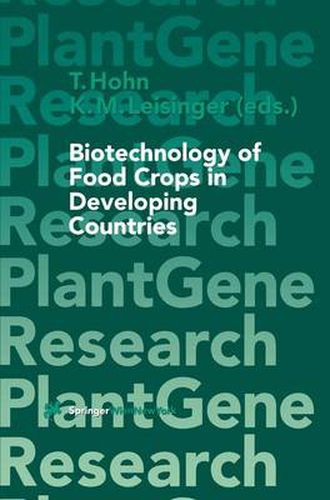Readings Newsletter
Become a Readings Member to make your shopping experience even easier.
Sign in or sign up for free!
You’re not far away from qualifying for FREE standard shipping within Australia
You’ve qualified for FREE standard shipping within Australia
The cart is loading…






This title is printed to order. This book may have been self-published. If so, we cannot guarantee the quality of the content. In the main most books will have gone through the editing process however some may not. We therefore suggest that you be aware of this before ordering this book. If in doubt check either the author or publisher’s details as we are unable to accept any returns unless they are faulty. Please contact us if you have any questions.
Tropical crops such as cowpea, yam, plantain, and cassava are heavily underresearched but, in addition to rice, maize, wheat, and potato, are important as primary or secondary food staples in the developing countries. The modern tools of molecular and cellular technology offer the opportunity not only to make substantial gains in knowledge of these crops, but also they overcome some of the obstacles which presently restrain both the genetic improvement and the productivity of these crops in tropical farming systems. Increased nutritional value of these crops, reduced post-harvest perishability, and lower costs of production are some of the advantages taken from biotechnology. Engineered genetic resistance would also allow to drastically reduce employment of pesticides, which at present are expensive or unavailable for farmers in developing countries and may create environmental and health hazards. In this book experts present opportunities to improve the efficiency of conventional plant breeding programs also taking into account the ethical and sociopolitical aspects of these technologies.
$9.00 standard shipping within Australia
FREE standard shipping within Australia for orders over $100.00
Express & International shipping calculated at checkout
This title is printed to order. This book may have been self-published. If so, we cannot guarantee the quality of the content. In the main most books will have gone through the editing process however some may not. We therefore suggest that you be aware of this before ordering this book. If in doubt check either the author or publisher’s details as we are unable to accept any returns unless they are faulty. Please contact us if you have any questions.
Tropical crops such as cowpea, yam, plantain, and cassava are heavily underresearched but, in addition to rice, maize, wheat, and potato, are important as primary or secondary food staples in the developing countries. The modern tools of molecular and cellular technology offer the opportunity not only to make substantial gains in knowledge of these crops, but also they overcome some of the obstacles which presently restrain both the genetic improvement and the productivity of these crops in tropical farming systems. Increased nutritional value of these crops, reduced post-harvest perishability, and lower costs of production are some of the advantages taken from biotechnology. Engineered genetic resistance would also allow to drastically reduce employment of pesticides, which at present are expensive or unavailable for farmers in developing countries and may create environmental and health hazards. In this book experts present opportunities to improve the efficiency of conventional plant breeding programs also taking into account the ethical and sociopolitical aspects of these technologies.